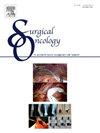Complete pathological response to neoadjuvant chemoradiotherapy is associated with improved long-term survival after surgical treatment for rectal cancer
IF 2.4
4区 医学
Q3 ONCOLOGY
引用次数: 0
Abstract
Background
Tumor regression after neoadjuvant chemoradiotherapy can improve the long-term outcomes of rectal cancer. However, it is unclear how the tumor regression grade (TRG) relates to long-term outcomes. We evaluated how the TRG affects overall survival in patients with rectal cancer who underwent neoadjuvant chemoradiotherapy prior to radical surgery.
Methods
All patients who underwent low anterior resection for rectal cancer after chemoradiotherapy over a 13-year period were included in this study. Perioperative and histopathological data of patients, including the TRG (categorized as no regression, minimal regression, moderate regression, near complete regression and complete regression) were evaluated. The correlation of TRG with overall survival was assessed using the log-rank test and Cox proportional hazards regression analysis.
Results
During the study period,193 patients underwent low anterior rectal resection after neoadjuvant chemoradiotherapy. The 90-day mortality rate was 1.5 % and the median follow up was 69.5 months. The 5-year and 10-year overall survival rates were 85.0 % and 69.8 %, respectively. Patients with complete regression had a significantly higher 10-year overall survival rate than other patients (87.3 % vs. 66.5 %, p = 0.031). Multivariate analysis revealed that older age (hazard ratio [HR] = 2.4,95 % confidence interval [95 % CI] = 1.3–4.6, p = 0.007) and complete pathological response (HR = 0.23, 95 % CI = 0.06–0.96, p = 0.044) were independent predictors of overall survival.
Conclusion
Complete pathological response after neoadjuvant therapy for rectal cancer improves overall survival after surgery. Further studies are needed to determine the factors that predict complete TRG to identify patients who would benefit most from neoadjuvant chemoradiotherapy.
新辅助放化疗的完全病理反应与直肠癌手术治疗后长期生存率的提高有关
背景:新辅助放化疗后肿瘤消退可以改善直肠癌的长期预后。然而,目前尚不清楚肿瘤消退等级(TRG)与长期预后的关系。我们评估了TRG如何影响根治性手术前接受新辅助放化疗的直肠癌患者的总生存率。方法本研究纳入13年以上化疗后行直肠癌低位前切除术的患者。评估患者围手术期和组织病理学数据,包括TRG(分为无回归、最小回归、中度回归、接近完全回归和完全回归)。采用log-rank检验和Cox比例风险回归分析评估TRG与总生存率的相关性。结果在研究期间,193例患者在新辅助放化疗后行低位直肠前切除术。90天死亡率为1.5%,中位随访69.5个月。5年和10年总生存率分别为85.0%和69.8%。完全消退患者的10年总生存率明显高于其他患者(87.3%比66.5%,p = 0.031)。多因素分析显示,年龄(风险比[HR] = 2.4, 95%可信区间[95% CI] = 1.3 ~ 4.6, p = 0.007)和完全病理反应(HR = 0.23, 95% CI = 0.06 ~ 0.96, p = 0.044)是总生存率的独立预测因素。结论直肠癌新辅助治疗后病理完全缓解可提高术后总生存率。需要进一步的研究来确定预测完全TRG的因素,以确定从新辅助放化疗中获益最多的患者。
本文章由计算机程序翻译,如有差异,请以英文原文为准。
求助全文
约1分钟内获得全文
求助全文
来源期刊

Surgical Oncology-Oxford
医学-外科
CiteScore
4.50
自引率
0.00%
发文量
169
审稿时长
38 days
期刊介绍:
Surgical Oncology is a peer reviewed journal publishing review articles that contribute to the advancement of knowledge in surgical oncology and related fields of interest. Articles represent a spectrum of current technology in oncology research as well as those concerning clinical trials, surgical technique, methods of investigation and patient evaluation. Surgical Oncology publishes comprehensive Reviews that examine individual topics in considerable detail, in addition to editorials and commentaries which focus on selected papers. The journal also publishes special issues which explore topics of interest to surgical oncologists in great detail - outlining recent advancements and providing readers with the most up to date information.
 求助内容:
求助内容: 应助结果提醒方式:
应助结果提醒方式:


